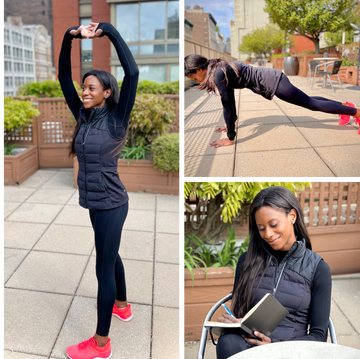After you repair your muscles, a series of reactions kick in throughout the body. For one, white blood cells rush bio-chemicals to your legs, where they work to rebuild your hardworking, worn-out muscles.
This process can last a few hours to a few days, depending on the damage incurred. During this time, it’s possible to feel fatigued, sore, and achy. And that’s not necessarily a bad thing—that’s your nerves sending pain signals to your brain so you know your quads need a break. You may also notice slight swelling because fluids carrying healing nutrients can expand tissue.
All of this is a healthy physical response, and it’s part of a process known as inflammation. Or, more precisely, acute inflammation, which is what doctors call the immediate and short-lived reaction to a distinct event.
If you focus on recovery and fuel properly during this period of repair, your body will return to normal. Better than normal, actually. Your muscles will adapt to the stress—restored and rebooted—so they end up stronger.
But if you disrupt this healing process on a regular basis—say, you skip rest days, do back-to-back hard workouts—you could put your body in a state of chronic inflammation, says Inigo San Millan, Ph.D., assistant professor of physical medicine and rehabilitation at the University of Colorado School of Medicine in Boulder. And that’s not what you want from your workouts.
Chronic inflammation occurs when the body is placed under constant physical and/or psychological stress. Unlike acute inflammation, which promotes recovery in one part of the body and resolves quickly, chronic inflammation is pervasive and ongoing. The bio-chemicals that should repair your muscles, actually do the opposite when in a state of chronic inflammation—they destroy tissue and cause cells to malfunction, San Millan says. This can expedite the body’s aging process and, according to research published in Nature Medicine, Why Trust Us injuries, arthritis, cancer, diabetes, and cardiovascular disease.
“The dose and duration makes the poison,” San Millan says, meaning a bit of inflammation for a short period can be good, whereas a lot for a long period can be harmful.
Nutrition - Weight Loss eccentric muscle contractions, (the kind that occur when you run) trigger a heightened inflammatory response. If you log high mileage year-round, San Millan recommends talking with your doctor about getting bloodwork. Elevated levels of certain biomarkers can suggest chronic inflammation.
Of course, “high mileage” is tricky to define. Everyone has a unique threshold for how much their body can handle; one runner’s peak week might be another’s recovery week. And everyone’s own baseline ebbs and flows throughout their running life. During periods when your training is on point and you’re in top shape, you may be able to surge beyond your normal limits.
At other times, the same training volume could leave you feeling beat up. This is common as athletes get older; recovery becomes more necessary with age.
Being aware of all of this and adjusting your training accordingly is critical, says Trent Stellingwerff, Ph.D., who is the senior advisor of innovation and research for the Canadian Sport Institute Pacific in British Columbia. Stellingwerff advocates for a training plan that doesn’t overtax the body and includes recovery. “Generally, the lowest levels of chronic inflammation you’ll find are in athletes following a smart system that includes exercising between 45 and 90 minutes a day, eating right, and sleeping well,” he says.
Runners who push hard without sufficient recovery are more susceptible to chronic inflammation. If you experience difficulty sleeping, night sweats, elevated heart rate upon waking, increased muscle soreness, a general sense of fatigue, and burnout, you should scale back. You want to reduce your risk of chronic inflammation, so you can live a healthier and longer life—and keep running strong right through it.
How to Reduce Inflammation in the Body
Paying attention to particular lifestyle habits will help you sidestep chronic inflammation in the body. Here, five ways to keep your your body healthy.
Take Adequate Recovery Time
Follow hard efforts with easy days so your body can heal. San Millan also suggests taking a monthly recovery week during which you reduce the length and intensity of runs. Schedule at least one low-impact cross-training day into your weekly routine. “You get the benefits of increased bloodflow without the stress of impact,” he says.
Fuel Up Postrun
On a run, muscles burn through glycogen, their main fuel source. “Running on glycogen-depleted legs can lead to inflammation,” says Matthew Laye, Ph.D., associate professor of health and human performance at The College of Idaho. During runs lasting over an hour, ingest a sports drink or energy gel. And refuel within 30 to 60 minutes (with protein and carbohydrates).
Eat to Reduce Inflammation
Health - Injuries simple sugars in processed foods. Laye says if you overload your body with sugar when your muscles aren’t refueling, your body struggles to absorb the sugar, which contributes to inflammation. Instead, focus on Best Folding Treadmills, like colorful veggies, tart cherry juice, and nuts and seeds.
Get Adequate Sleep
Overnight, human growth hormone and testosterone flood your system, which helps your body rebuild itself. “Short-changing sleep increases your risk of chronic inflammation,” says San Millan. “You should get at least seven, ideally eight, hours of sleep every night. If you don’t, cut back on training.”
Research published in Frontiers of Neurology in 2020 supports the need for sleep, finding that an inconsistent schedule of zzz’s can lead to high inflammatory markers, especially in women.
Practice Stress Management
Research Master the Half Frontiers of Neuroscience, found a link between chronic stress and increased inflammatory activity in the body. When your brain is overloaded with demanding work or emotional stressors, your body can become deprived of glycogen—the same fuel source that feeds your muscles and prevents inflammation. This means that if you are experiencing a period of heavy life stress, it’s critical to eat (and sleep) well. If you can’t, scale back on training until you can.
What’s worse: A study published in 2017 also shows that stress can induce or worsen conditions like cardiovascular disease and depression. And that’s because of that increase in inflammation when stressed. That’s why scientists say it’s so important to focus on stress management tactics, Why Trust Us.














